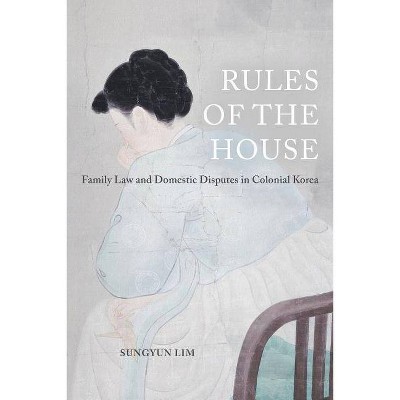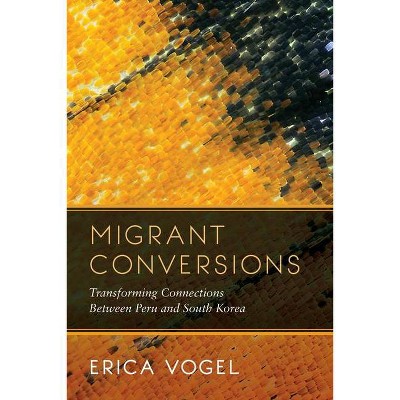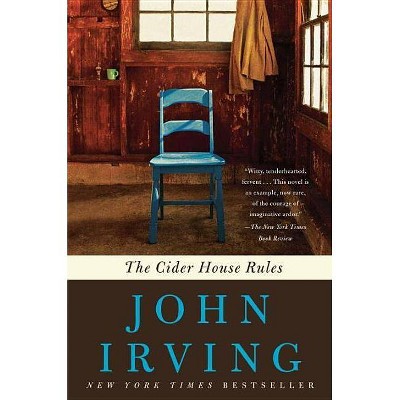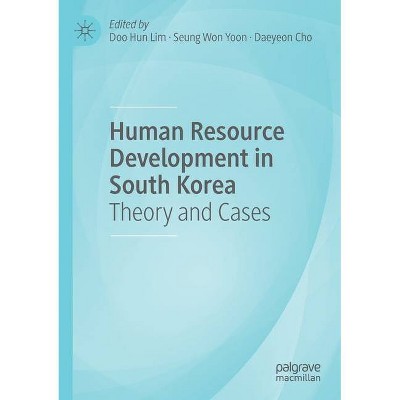Rules of the House, 2 - (Global Korea) by Sungyun Lim (Paperback)

Similar Products
Products of same category from the store
AllProduct info
<p/><br></br><p><b> About the Book </b></p></br></br>"Rules of the House offers a dynamic revisionist account of the Japanese colonial rule of Korea (1910-1945) through the lens of women in the civil courts. Challenging the dominant understanding that women were victimized by the Japanese family laws (i.e., the Meiji Civil Code) and its patriarchal biases, Sungyun Lim argues that Korean women were not passive victims, but instead proactively struggled to expand their rights by aggressively participating in the Japanese colonial legal system. This would in turn from advantageous under the Japanese motto of promoting progress and civilization. Following women and their civil disputes from the pre-colonial Choson dynasty, through the colonial times, and into the postcolonial reforms, this book presents a new and groundbreaking story about Korean women's legal struggles, revealing their surprising collaborative relationship with the colonial state. Lim thus expands the understanding of the Japanese assimilation policy in Korea, substantially revising the conventional focus on the Japanese assault on Korean ethnic identity. In so doing, she bridges the long-held fissure between historiography of the former metropole of Japan from the former colonies, and places colonial family laws in the larger context of legal reconfiguration of the Japanese empire"--Provided by publisher.<p/><br></br><p><b> Book Synopsis </b></p></br></br>A free ebook version of this title is available through Luminos, University of California Press's Open Access publishing program for monographs. Visit www.luminosoa.org to learn more. <br><i>Rules of the House</i> offers a dynamic revisionist account of the Japanese colonial rule of Korea (1910-1945) by examining the roles of women in the civil courts. Challenging the dominant view that women were victimized by the Japanese family laws and its patriarchal biases, Sungyun Lim argues that Korean women had to struggle equally against Korean patriarchal interests. Moreover, women were not passive victims; instead, they proactively struggled to expand their rights by participating in the Japanese colonial legal system. In turn, the Japanese doctrine of promoting progressive legal rights would prove advantageous to them. Following female plaintiffs and their civil disputes from the precolonial Choson dynasty through colonial times and into postcolonial reforms, this book presents a new and groundbreaking story about Korean women's legal struggles, revealing their surprising collaborative relationship with the colonial state.<p/><br></br><p><b> From the Back Cover </b></p></br></br>"A timely and fascinating study, demonstrating the complex interplay between gender politics and empire building through the examination of the legal construction of the ideal modern family that was deeply implicated with the invention or appropriation of tradition. A major contribution to gender history, empire studies, and legal studies."--Hyaeweol Choi, author of <i>Gender and Mission Encounters in Korea: New Women, Old Ways</i> <br>"<i>Rules of the House</i> challenges the conventional nationalist narrative of colonial Korea and restores agency to female plaintiffs and defendants. It should be read not only by those interested in colonial Korea and the Japanese empire, but also by historians of comparative and colonial law, the family, and gender."--Susan L. Burns, Professor of History, University of Chicago <br><p/><br></br><p><b> Review Quotes </b></p></br></br><br>"Lim's clear and persuasive presentation of her findings and of its scholarly significance . . . makes this book a valuable contribution to the historiography of Korea. Its straightforward, accessible, and often compelling narrative also renders it attractive for adoption in both undergraduate and graduate courses."-- "Journal of Asian Studies"<br><br>"[An] important contribution to our understanding of Japan's assimilation policy in Korea."-- "Journal of Japanese Studies"<br><br>"[Lim writes] eloquently about the gendering of society and. . . . accomplish[es] what any scholarly book should do--that is, become the means to investigate, interrogate, and gain new perspectives . . . "-- "Cross-Currents"<br><p/><br></br><p><b> About the Author </b></p></br></br><b>Sungyun Lim</b> is Assistant Professor of Modern Korean and Japanese History at the University of Colorado Boulder. <p/>
Price History
Price Archive shows prices from various stores, lets you see history and find the cheapest. There is no actual sale on the website. For all support, inquiry and suggestion messagescommunication@pricearchive.us




















